A Complete Guide to Male Archetypes: Alpha, Beta, Sigma, and Beyond
Understanding male archetypes can offer insightful perspectives on personality types and social dynamics. Common archetypes like Alpha and Beta are well-known, but there are several others, including Sigma, Omega, Delta, Gamma.

Quiz at the bottom
Understanding male archetypes can offer insightful perspectives on personality types and social dynamics. Common archetypes like Alpha and Beta are well-known, but there are several others, including Sigma, Omega, Delta, Gamma. There are also more nuanced variations like Theta and Lambda. In this comprehensive guide, we'll break down each archetype, discussing their defining traits and comparing them to one another.
An excellent way to remember all this is with this mnemonic:
"All Brave Soldiers Often Do Great Things Like Zeus."
- A - Alpha (Leader)
- B - Beta (Supporter)
- S - Sigma (Lone Wolf)
- O - Omega (Introvert)
- D - Delta (Everyman)
- G - Gamma (Empath)
- T - Theta (Thinker)
- L - Lambda (Rebel)
- Z - Zeta (Critic)
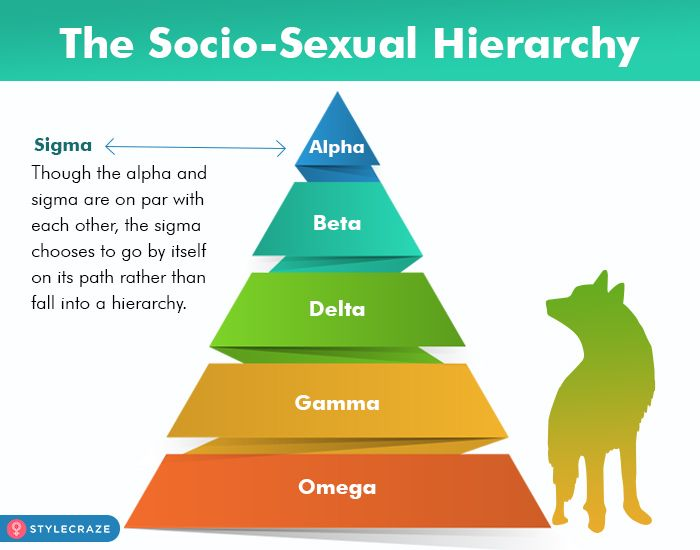
Alpha Male
The Alpha male is the classic "take-charge" personality, often seen as a leader in social and professional settings. Think of someone like Dwayne "The Rock" Johnson, whose charisma, confidence, and ability to lead have made him a global icon—not just in wrestling but in Hollywood and business. Alphas are the ones stepping up to organize, lead, and make decisions, whether it’s running a company or captaining a sports team.

What Makes an Alpha Tick
Alphas thrive on interaction and competition. They’re assertive, great at rallying others around a shared goal, and naturally gravitate toward roles where they can influence and lead. For instance, Steve Jobs embodied many Alpha traits—his confidence and leadership transformed Apple into a global powerhouse.
Key Traits
- Confidence: Alphas walk into a room and own it, making others feel secure.
- Assertiveness: They speak up, make decisions, and often get their way.
- Leadership: They take charge and inspire others to follow.
Potential Careers for Alphas
- CEO/Manager: Leadership roles come naturally. They excel in jobs requiring authority and decision-making.
- Politiciansremarkable: Their ability to connect and lead makes them persuasive leaders.
- Athlete/Coach: Competitive settings where they can lead a team suit them well.
- Sales/Marketing: Their charm and confidence make them natural persuaders.
What Alphas Love and Hate
- Love: Winning, recognition, and being in control. They thrive when their abilities are acknowledged and respected.
- Hate: Losing, being ignored, or feeling undermined. They can struggle when their authority is questioned.
Challenges of Being an Alpha
Their dominance can sometimes come off as arrogance. Think of someone who steamrolls a group project because they believe they know best. While confidence is a strength, it can border on dismissiveness if unchecked. For example, Elon Musk's bold leadership has led to remarkable achievements, but his brashness sometimes alienates others.
Comparison to Sigmas
Unlike Alphas, who seek power within a group, Sigmas operate on the edges. They’re independent and prefer forging their path, like Keanu Reeves, who avoids the limelight yet commands immense respect. Alphas thrive on group dynamics and hierarchy, while Sigmas value autonomy.
In short, Alphas are the ones you turn to when leadership and action are needed. They shine brightest in environments that reward confidence, competition, and decisive action, but their success often depends on balancing dominance with understanding.
Beta Male
Beta males are often the "steady hands" in any situation—loyal, dependable, and approachable. Think of Jim Halpert from The Office. He’s a classic Beta: supportive, likable, and reliable, but he’s not the one vying to take over the room or lead the charge. Instead, he focuses on maintaining harmony and contributing in his way, often making him a beloved group presence.
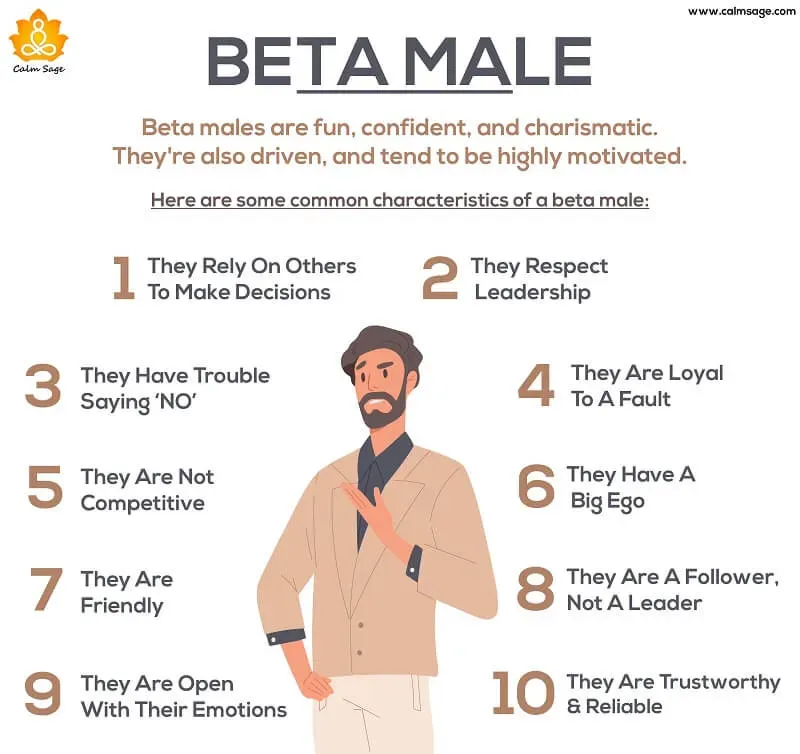
What Defines a Beta Male
Betas thrive in roles where collaboration, dependability, and emotional intelligence are valued. You can count on them to have your back or help the team succeed without feeling the need to steal the spotlight. Their easygoing nature makes them great friends and trusted colleagues, but their aversion to conflict or risk-taking can sometimes be seen as a lack of drive.
Key Traits
- Loyalty: Betas are the people who stick by your side through thick and thin, making them great in relationships and friendships.
- Reliability: Need something done? You can trust a Beta to follow through.
- Supportive Nature: They’re natural team players who enjoy helping others shine.
Potential Careers for Betas
- Teacher or Counselor: Their empathy and desire to support others make them great in nurturing roles.
- Engineer or Analyst: Reliable and focused, Betas excels in positions requiring attention to detail and teamwork.
- Nurse or Social Worker: Jobs centered on caring for others are a natural fit.
- Administrative Roles: They enjoy keeping things running smoothly without the stress of leading.
What Betas Love and Hate
- Love: Stability, teamwork, and a sense of belonging. Betas often enjoy strong, lasting relationships and working in environments where they feel valued.
- Hate: Conflict, unnecessary competition, and high-pressure leadership roles. They’re happiest when they can contribute without feeling overwhelmed.
Challenges of Being a Beta
Betas may struggle with assertiveness. For example, someone in a workplace might pass them over for a promotion because they didn’t advocate for themselves. Their tendency to avoid confrontation can also lead to others taking advantage of their kindness.
Consider someone like Neville Longbottom from Harry Potter. At first glance, he’s overshadowed by more dominant personalities, but his loyalty and dependability eventually show that Betas can rise to the occasion when needed.
Comparison to Alphas and Sigmas
- Compared to Alphas: Betas prefer following rather than leading. They prioritize harmony and group cohesion over power and control. While an Alpha might be the CEO, a Beta is the dependable right-hand person ensuring the vision comes to life.
- Compared to Sigmas: Betas are more conformist. Sigmas, like the quiet but self-reliant loner, forge their own path, whereas Betas stick to societal norms and value fitting in.
Sigma Male
The Sigma male is often called the "Lone Wolf," and for good reason. Imagine someone like John Wick—reserved, self-reliant, and capable, yet uninterested in climbing social ladders or playing by traditional rules. Sigmas are independent thinkers who march to the beat of their own drum, making them intriguing and sometimes enigmatic to others.
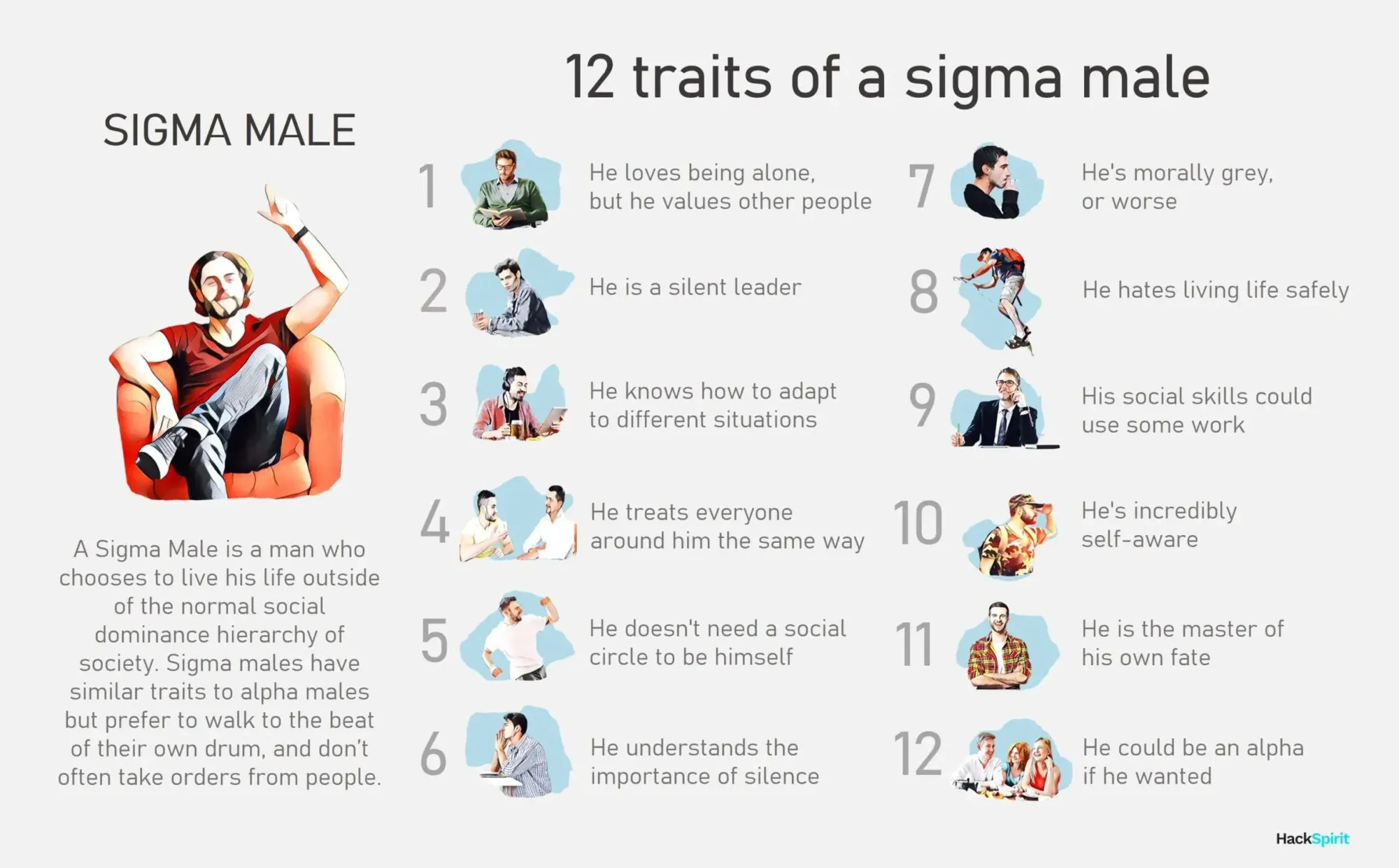
What Defines a Sigma Male
Sigmas possess many qualities as Alphas—confidence, intelligence, and charisma—but they channel these traits differently. They prioritize their freedom and personal goals instead of seeking leadership or social validation. They thrive in environments where they can work independently and prefer relationships built on mutual respect rather than obligation.
Key Traits
- Independence: They value autonomy above all and dislike being tied to social hierarchies.
- Introspection: Sigmas often think deeply about their actions and prefer meaningful connections over shallow interactions.
- Adaptability: They’re flexible and thrive in various situations, whether working alone or alongside others.
Potential Careers for Sigmas
- Entrepreneur/Freelancer: Their self-reliance and drive make them natural at running their own businesses.
- Artist/Writer: Creative fields let them express themselves without being constrained by traditional structures.
- Software Developer/Engineer: They excel in technical roles that allow them to solve problems independently.
- Adventurer/Travel Blogger: Their love for freedom and exploration makes unconventional careers appealing.
What Sigmas Love and Hate
- Love: Freedom, solitude, and personal growth. Sigmas cherish opportunities to learn and challenge themselves without being micromanaged.
- Hate: Conformity, unnecessary rules, and authority figures who impose control. They bristle at situations where they feel boxed in.
Challenges of Being a Sigma
Sigmas can sometimes seem aloof or distant, which can make it harder for them to form close relationships. For instance, while someone like Elon Musk exhibits many Sigma qualities—pioneering his own vision and defying norms—his unconventional approach has occasionally alienated those around him. Sigmas may also struggle with trust, preferring to rely on themselves rather than depend on others.
Comparison to Alphas and Betas
- Compared to Alphas: Both are confident and capable, but while Alphas dominate social hierarchies, Sigmas sidestep them altogether. Alphas are like charismatic CEOs, while Sigmas are visionary inventors working behind the scenes.
- Compared to Betas: Sigmas are independent to a fault, unlike Betas, who thrive on being part of a group. While Betas conform to societal expectations, Sigmas forge their own path, often disregarding norms.
Relatable Examples
Consider someone like Keanu Reeves, who embodies Sigma energy. He’s humble, reflective, and avoids the limelight, yet he’s immensely respected for his talent and kindness. Another example is Jason Bourne—a self-reliant figure focused on his own mission, often working alone but proving to be as capable as any Alpha leader.
In essence, Sigmas are the quiet strategists and independent trailblazers. They don’t seek approval or control, but their unique qualities often command respect. They thrive in roles that reward innovation and adaptability, but their success depends on balancing independence with forming meaningful connections.
Omega Male
Omega males are the ultimate free spirits, often unconcerned with social expectations or competition. Think of someone like Sheldon Cooper from The Big Bang Theory—highly intellectual, quirky, and entirely focused on their own interests, with little regard for how others perceive them. Omegas are introverted and self-reliant but lack the drive for social dominance or professional success that defines other archetypes.

What Defines an Omega Male
Omegas march entirely to their own rhythm, often immersed in personal passions like gaming, collecting, or intellectual pursuits. Unlike Sigmas, who are highly independent but still driven to achieve, Omegas prioritize personal enjoyment and satisfaction over societal measures of success. They are often indifferent to leadership roles and group dynamics, preferring solitude or small, close-knit circles.
Key Traits
- Introversion: Omegas are content spending time alone and often prefer it to being part of a group.
- Independence: They value their freedom and resist conforming to social norms.
- Non-Competitiveness: They are not driven by competition or the need to prove themselves to others.
Potential Careers for Omegas
- Researcher or Academic: They excel in roles that let them dive deep into niche interests without external pressure.
- Writer or Artist: Creative outlets that allow self-expression and independence suit them well.
- Game Designer or Programmer: These roles cater to their love of intellectual and technical pursuits, often in solitary environments.
- Archivist or Librarian: Jobs focused on knowledge and organization, often in quiet settings, align with their temperament.
What Omegas Love and Hate
- Love: Hobbies, intellectual freedom, and personal time. Omegas are happiest when they can explore their passions without interference.
- Hate: Social obligations, competition, and conforming to societal expectations. They dislike being pushed to fit into traditional roles or hierarchies.
Challenges of Being an Omega
Omegas can struggle with social awkwardness or lack of ambition. For instance, someone deeply engrossed in a hobby like building intricate models might neglect career or relationship goals. Their indifference to progress can also lead to stagnation, making it hard for them to adapt to life’s demands.
Consider characters like Frodo Baggins from The Lord of the Rings. He’s reluctant to take on leadership but rises to the occasion when absolutely necessary. While Omegas typically avoid the spotlight, they can still contribute meaningfully in their own unique ways when motivated.
Comparison to Sigmas, Alphas, and Betas
- Compared to Sigmas: Both value independence, but Sigmas are driven to achieve on their own terms, while Omegas are content with their hobbies and personal interests. Sigmas are lone wolves; Omegas are more like peaceful hermits.
- Compared to Alphas: Alphas thrive on dominance and competition, while Omegas avoid both entirely.
- Compared to Betas: Betas enjoy group cohesion and societal norms, whereas Omegas prefer solitude and actively resist conformity.
Relatable Examples
Imagine a skilled yet reclusive chess player who spends hours studying the game for personal enjoyment but never competes in tournaments. Another example could be someone obsessed with a niche topic, like astronomy, building intricate telescopes as a hobby, but avoiding professional recognition or collaboration.
Omegas are the quiet individualists who find fulfillment in their own worlds. They bring value through their unique perspectives and passions but may need to balance their independence with occasional engagement in broader societal demands.
Delta Male
Delta males are often called the "everyman," embodying the quiet backbone of society. They are the dependable, hard-working individuals who may not crave the spotlight but are essential in keeping things running smoothly. Think of someone like Samwise Gamgee from The Lord of the Rings—steady, reliable, and pragmatic, focused on doing what needs to be done without seeking recognition.
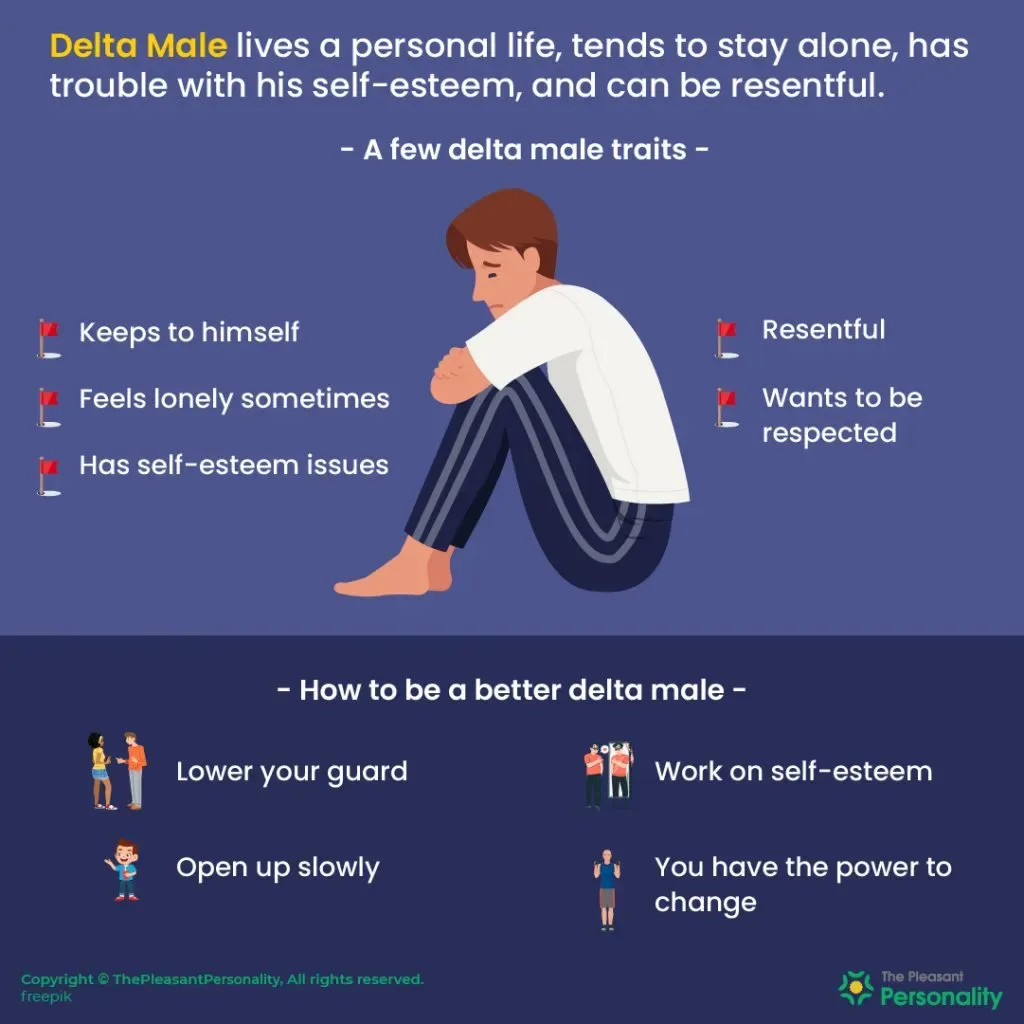
What Defines a Delta Male
Deltas values stability and responsibility. They often focus on building a secure life through hard work or maintaining relationships. Life experiences, such as setbacks or disillusionment, may have reshaped their ambition or confidence, but this has also made them resilient and pragmatic.
Key Traits
- Pragmatism: Deltas are grounded and realistic, preferring to focus on what works rather than lofty ideals.
- Reliability: They are dependable and consistent, both in their work and relationships.
- Resilience: Challenges in life have made them tough and adaptable.
Potential Careers for Deltas
- Skilled Tradesperson: Their reliability and hands-on skills make them great at carpentry, plumbing, or electrical work.
- Teacher or Trainer: They enjoy contributing to a community, sharing knowledge, and guiding others.
- Healthcare Worker: Their sense of responsibility suits jobs like nursing, paramedics, or therapy.
- Project Manager: Pragmatic and organized, Deltas excel at keeping teams focused and tasks on track.
What Deltas Love and Hate
- Love: Stability, purpose, and a sense of belonging. Deltas often enjoy being part of a community or family and value their contributions being recognized subtly.
- Hate: Chaos, unnecessary risks, and unreliable people. They dislike situations where their efforts are undermined or where uncertainty threatens their sense of security.
Challenges of Being a Delta
Deltas can be overly cautious and sometimes cynical. For example, a Delta male who experienced failure in a business venture might hesitate to retake risks, even when opportunities arise. Their guarded nature can make them reluctant to open up, hindering personal or professional relationships.
Consider someone who works diligently in a corporate job but chooses not to chase promotions, preferring stability over climbing the ladder. While this outlook brings security, it might also limit growth if fear of failure outweighs ambition.
Comparison to Other Archetypes
- Compared to Alphas: Deltas avoid competition for dominance. They prefer collaboration and practicality over being in control.
- Compared to Betas: While both value stability, Deltas are more independent and less socially driven. Betas often seek group harmony, whereas Deltas focus on fulfilling their personal role.
- Compared to Sigmas: Sigmas are fiercely independent and driven by autonomy, while Deltas are more community-oriented and pragmatic.
Relatable Examples
Think of someone like Ron Swanson from Parks and Recreation—he’s independent, values hard work, and is skeptical of authority, yet deeply cares about his role and the people around him. Another example could be a family man who works a steady job, prioritizing his household over personal accolades or ambitions.
In summary, Deltas represent the grounded, dependable individuals who thrive on stability and purpose. They may not aim for the spotlight, but their resilience and reliability make them invaluable in any group. However, balancing their caution with openness to new opportunities can help them achieve even greater fulfillment.
Gamma Male
Gamma males are often called the "adaptable all-rounders," blending traits from other archetypes with a focus on self-improvement and emotional connection. Think of someone like Ted Mosby from How I Met Your Mother—romantic, introspective, and ambitious but not driven by dominance or external validation. Gammas are versatile and empathetic and aim to balance personal growth with meaningful relationships.

What Defines a Gamma Male
Gammas thrive on introspection and adaptability. They are often self-aware, striving to grow in various aspects of life, whether it’s learning new skills or improving emotional intelligence. Unlike Alphas, who are outwardly focused on leadership, Gammas focus on their inner journey and their ability to connect with others on a deeper level.
Key Traits
- Adaptability: Gammas can fit into different roles, adjusting their approach based on the situation.
- Introspection: They prioritize understanding themselves and continually improving.
- Empathy: Gammas are emotionally intelligent, making them great at forming meaningful connections.
Potential Careers for Gammas
- Counselor or Therapist: Their emotional intelligence and empathy suit roles where listening and guidance are key.
- Creative Professional: Gammas excel in writing, filmmaking, or design, where self-expression and adaptability are valued.
- Human Resources or Mediator: Their ability to balance relationships and conflict resolution makes them natural in these roles.
- Teacher or Mentor: They enjoy fostering growth in others, aligning with their introspective and empathetic nature.
What Gammas Love and Hate
- Love: Self-discovery, meaningful relationships, and helping others. Gammas find joy in personal growth and connecting with people emotionally.
- Hate: Superficiality, rigid hierarchies, and being undervalued. They dislike environments that stifle their creativity or emotional expression.
Challenges of Being a Gamma
Gammas may struggle with overthinking and indecisiveness. For example, a Gamma male who’s deciding between pursuing a creative passion or sticking to a stable career might feel stuck in analysis paralysis. Their people-pleasing tendencies can also make them vulnerable to being taken advantage of in relationships or workplaces.
Consider someone who constantly takes on extra responsibilities at work to maintain harmony but neglects their own needs. While their adaptability is a strength, Gammas need to set boundaries and focus on their priorities.
Comparison to Other Archetypes
- Compared to Alphas: While Alphas dominate through confidence and leadership, Gammas are more introspective and focused on building relationships. They lead through understanding rather than authority.
- Compared to Betas: Both value relationships, but Gammas are more growth-oriented and less likely to follow the status quo.
- Compared to Sigmas: Gammas are more socially engaged and emotionally connected than Sigmas, who prioritize independence and autonomy.
Relatable Examples
Think of someone like Will Hunting from Good Will Hunting. He’s introspective, intelligent, and emotionally sensitive, but also struggles with indecision and self-doubt. Another example might be a passionate teacher who connects deeply with students, constantly evolving their teaching style to serve others better.
In summary, Gammas are versatile and emotionally driven individuals who balance personal growth with interpersonal solid connections. They thrive in environments that reward creativity, empathy, and adaptability but need to guard against overthinking and a tendency to put others before themselves.
Theta Male
Theta males are the thinkers, the deep intellectuals of the archetypes. They value ideas over influence and curiosity over control. Imagine someone like Albert Einstein—devoted to unraveling the mysteries of the universe, often detached from practical concerns or social hierarchies. Thetas thrive in environments where they can explore, create, and analyze, finding fulfillment in their intellectual pursuits.
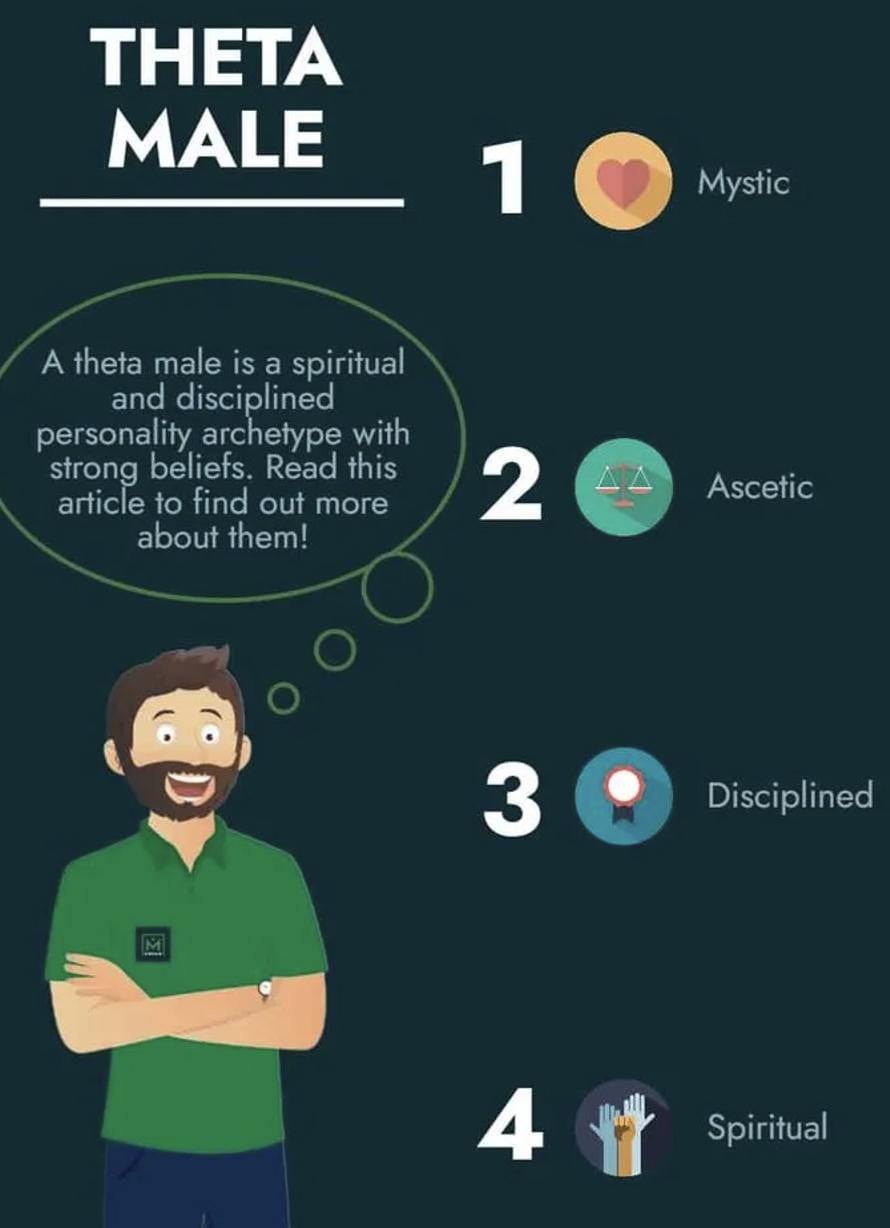
What Defines a Theta Male
Thetas are driven by a love of knowledge and a desire to understand the world more deeply. They are introspective and creative, often gravitating toward philosophical, scientific, or artistic exploration. While they might come across as aloof or socially detached, they are usually just profoundly immersed in their thoughts and ideas.
Key Traits
- Intellectualism: Thetas are fascinated by complex concepts and enjoy diving into challenging problems.
- Creativity: Their innovative thinking often leads to unique ideas and solutions.
- Philosophical Nature: They find joy in exploring existential questions and abstract theories.
Potential Careers for Thetas
- Scientist or Researcher: Their curiosity and focus make them natural in fields like physics, biology, or artificial intelligence.
- Philosopher or Writer: Thetas excel in exploring and expressing complex ideas through philosophy, literature, or journalism.
- Inventor or Innovator: Their creativity allows them to dream up and design groundbreaking concepts.
- Professor or Educator: Sharing knowledge in academic settings aligns perfectly with their intellectual passions.
What Thetas Love and Hate
- Love: Mental stimulation, discovery, and creativity. Thetas thrive when they can spend time learning, experimenting, or solving intellectual puzzles.
- Hate: Mundane tasks, rigid structures, and superficial interactions. They can feel drained by environments that lack depth or challenge.
Challenges of Being a Theta
Thetas can sometimes become overly detached from practical matters. For example, a Theta might spend days perfecting a theoretical project without considering how it can be implemented in the real world. Their intellectual focus can also lead to social isolation if they neglect relationships in favor of their pursuits.
Consider someone deeply passionate about studying black holes but uninterested in presenting their findings to a broad audience. While their work might be brilliant, their aversion to practical applications or communication could limit its impact.
Comparison to Other Archetypes
- Compared to Alphas: Thetas derive their satisfaction from understanding rather than leading. While Alphas seek power and influence, Thetas prefer intellectual mastery.
- Compared to Betas and Deltas: Thetas are more introverted and curious, focusing on abstract exploration rather than community roles or stability.
- Compared to Sigmas: Both are independent, but Sigmas focus on personal freedom and autonomy, while Thetas prioritize intellectual freedom and mental exploration.
Relatable Examples
Think of someone like Nikola Tesla, whose groundbreaking inventions and visionary thinking were paired with a tendency toward isolation and detachment. Another example might be a reclusive artist or philosopher, deeply immersed in creating meaningful work but indifferent primarily to social recognition or practical concerns.
In summary, Theta males are the intellectual explorers, driven by a desire to understand and create. They thrive in environments that reward curiosity and creativity, but they may need to work on staying connected to the practical and social aspects of life to fully realize their potential.
Lambda Male
Theta males are the thinkers, the deep intellectuals of the archetypes. They value ideas over influence and curiosity over control. Imagine someone like Albert Einstein—devoted to unraveling the mysteries of the universe, often detached from practical concerns or social hierarchies. Thetas thrive in environments where they can explore, create, and analyze, finding fulfillment in their intellectual pursuits.

What Defines a Theta Male
Thetas are driven by a love of knowledge and a desire to understand the world on a deeper level. They are introspective and creative, often gravitating toward philosophical, scientific, or artistic exploration. While they might come across as aloof or socially detached, they are usually just deeply immersed in their thoughts and ideas.
Key Traits
- Intellectualism: Thetas are fascinated by complex concepts and enjoy diving into challenging problems.
- Creativity: Their innovative thinking often leads to unique ideas and solutions.
- Philosophical Nature: They find joy in exploring existential questions and abstract theories.
Potential Careers for Thetas
- Scientist or Researcher: Their curiosity and focus make them natural in fields like physics, biology, or artificial intelligence.
- Philosopher or Writer: Thetas excel in exploring and expressing complex ideas through philosophy, literature, or journalism.
- Inventor or Innovator: Their creativity allows them to dream up and design groundbreaking concepts.
- Professor or Educator: Sharing knowledge in academic settings aligns perfectly with their intellectual passions.
What Thetas Love and Hate
- Love: Mental stimulation, discovery, and creativity. Thetas thrive when they can spend time learning, experimenting, or solving intellectual puzzles.
- Hate: Mundane tasks, rigid structures, and superficial interactions. They can feel drained by environments that lack depth or challenge.
Challenges of Being a Theta
Thetas can sometimes become overly detached from practical matters. For example, a Theta might spend days perfecting a theoretical project without considering how it can be implemented in the real world. Their intellectual focus can also lead to social isolation if they neglect relationships in favor of their pursuits.
Consider someone deeply passionate about studying black holes but uninterested in presenting their findings to a broad audience. While their work might be brilliant, their aversion to practical applications or communication could limit its impact.
Comparison to Other Archetypes
- Compared to Alphas: Thetas derive their satisfaction from understanding rather than leading. While Alphas seek power and influence, Thetas prefer intellectual mastery.
- Compared to Betas and Deltas: Thetas are more introverted and curious, focusing on abstract exploration rather than community roles or stability.
- Compared to Sigmas: Both are independent, but Sigmas focus on personal freedom and autonomy, while Thetas prioritize intellectual freedom and mental exploration.
Relatable Examples
Think of someone like Nikola Tesla, whose groundbreaking inventions and visionary thinking were paired with a tendency toward isolation and detachment. Another example might be a reclusive artist or philosopher, deeply immersed in creating meaningful work but largely indifferent to social recognition or practical concerns.
In summary, Theta males are intellectual explorers driven by a desire to understand and create. They thrive in environments that reward curiosity and creativity, but they may need to work on staying connected to the practical and social aspects of life to fully realize their potential.
Zeta Male
Zeta males are the independent critics of societal norms, particularly around gender roles and relationships. They focus on living by their own principles, rejecting traditional expectations about success, dating, and social roles. Imagine someone like George Carlin—a sharp, critical thinker who openly challenges societal constructs while maintaining a strong sense of individuality. Zetas prioritize self-determination and intellectual freedom over conforming to mainstream ideals.
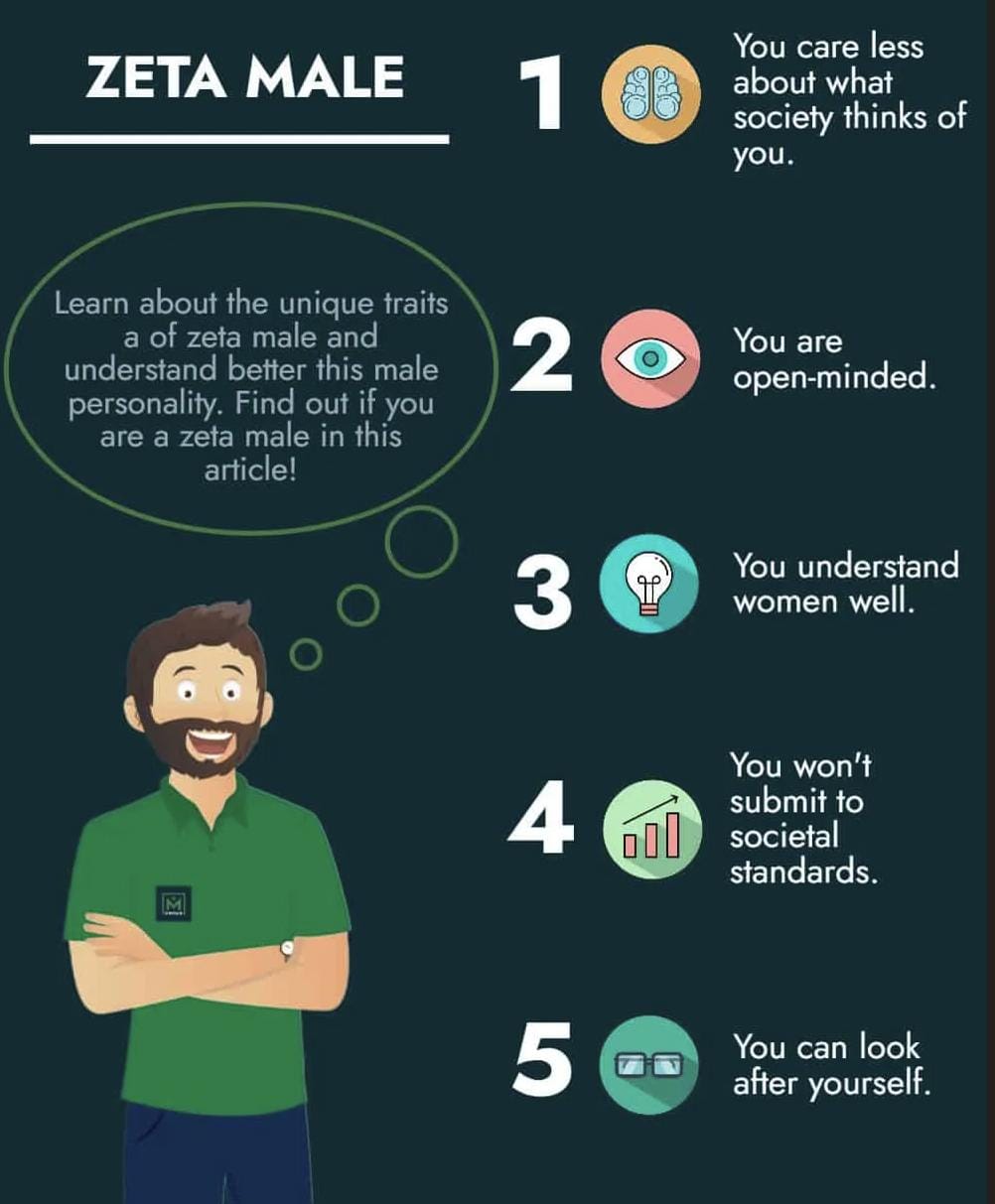
What Defines a Zeta Male
Zetas are characterized by their refusal to follow conventional scripts, especially when it comes to relationships and social dynamics. They question and critique societal systems, opting to live life on their terms. This mindset often makes them fiercely independent, but it can also lead to cynicism or isolation if taken to extremes.
Key Traits
- Independence: Zetas refuses to let societal norms dictate their choices, especially regarding relationships.
- Non-Conformity: They challenge mainstream expectations and embrace alternative perspectives.
- Critical Thinking: Zetas actively analyze and question societal constructs, particularly those they perceive as unfair or restrictive.
Potential Careers for Zetas
- Philosopher or Writer: Their critical nature and deep thinking are ideal for exploring and challenging societal issues.
- Activist or Advocate: They excel in roles that reshape societal norms or champion new perspectives.
- Freelance Creative: Zetas thrive in careers where they can work independently and express their unique views.
- Tech Innovator or Analyst: Roles in technology or data analysis suit their critical and unconventional approach to problem-solving.
What Zetas Love and Hate
- Love: Intellectual freedom, personal autonomy, and questioning authority. Zetas are happiest when they can live authentically, free from societal pressures.
- Hate: Traditional gender roles, societal conformity, and structures that they perceive as limiting or unfair. They often bristle at rigid systems that conflict with their values.
Challenges of Being a Zeta
Zetas’ rejection of conventional norms can sometimes isolate them from others who don’t share their worldview. For example, a Zeta male who refuses to engage in traditional dating dynamics might struggle to find meaningful relationships or feel disconnected from societal milestones like marriage or family life. Additionally, their cynicism may alienate them from potential allies or partners who perceive them as overly critical.
Imagine someone who chooses to live off-grid, rejecting societal expectations and the convenience of mainstream systems. While this lifestyle reflects their principles, it may come with challenges in maintaining relationships or accessing resources.
Comparison to Other Archetypes
- Compared to Lambda Males: Both reject societal norms, but Lambdas focus on actively embracing alternative lifestyles, while Zetas critique and deconstruct the societal frameworks themselves.
- Compared to Sigmas: Zetas share Sigmas' independence but are more vocal and philosophical about their rejection of societal expectations.
- Compared to Alphas: Alphas work within societal hierarchies to lead, while Zetas stand outside and critique the system altogether.
Relatable Examples
Think of someone like Noam Chomsky, who critiques societal and political structures while remaining steadfast in his principles. Another example could be a minimalist content creator who actively questions consumer culture and traditional lifestyles, offering alternative paths to fulfillment.
In summary, Zeta males are the thoughtful challengers of societal norms. They thrive in intellectual and independent roles, often choosing unconventional paths that align with their values. While their perspectives can be refreshing and transformative, they may need to balance their critique of the system with building meaningful connections and embracing collaboration.
Conclusion
Male archetypes offer a framework to understand different personality types and behaviors in social dynamics. While these archetypes are not definitive or exhaustive, they provide insight into how people navigate relationships, power, and personal development. Individuals can also embody traits from multiple archetypes, adding nuance and acknowledging the complexity of personality. Whether you're an Alpha seeking leadership, a Sigma craving autonomy, or a Theta delving into intellectual pursuits, recognizing these archetypes can help in self-reflection and understanding social interactions.
Each archetype has strengths and weaknesses, and no one type is superior. Understanding these dynamics allows for a broader appreciation of how individuals contribute uniquely to society, whether as leaders, thinkers, supporters, or non-conformists.




